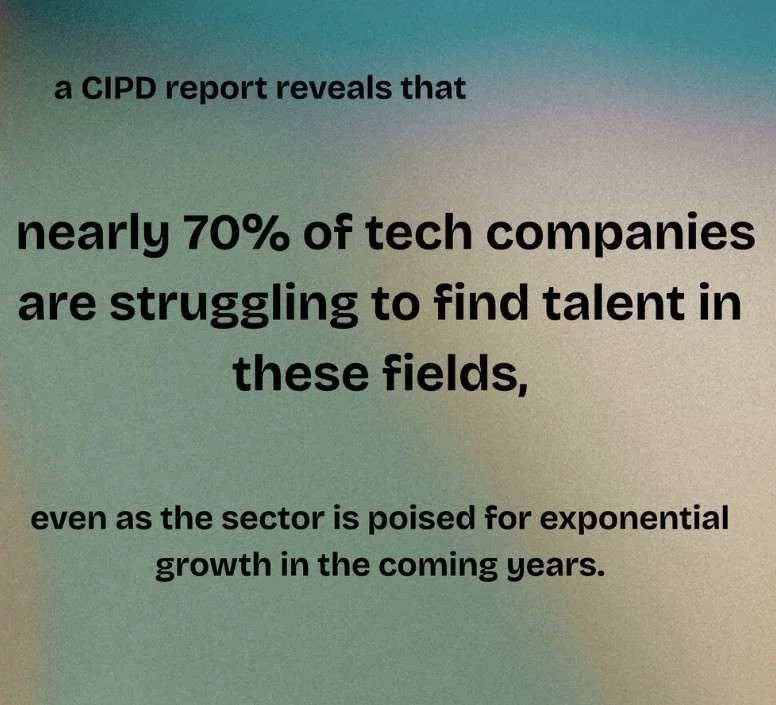Closing the Skills Gap with Advanced Management Skills Training
To thrive in the evolving UK workplace, closing the skills gap isn’t just a choice—it’s an imperative. Here's how advanced management skills can pave the way for sustainable growth.
The skills gap in the UK isn’t just a challenge—it’s a ticking time bomb. With rapid changes in technology and shifting workforce needs, many workers find themselves unable to meet the demands of the modern workplace. But what if the solution wasn’t simply about hiring new talent, but developing the potential that already exists?
Skills Gap in the UK
You’ve probably felt it—your skills sometimes don’t quite match what the job market expects. In the UK, over 60% of companies report struggling to find candidates with the right skills. Particularly in key sectors such as technology, finance, and manufacturing, the demand for new and specific skills is growing ever more urgent.
In technology, for example, there's a pressing need for expertise in artificial intelligence (AI), data analytics, and cybersecurity.
The problem is clear: while there’s no shortage of skilled workers, their abilities often don’t match what the market demands.
In finance, the need for skills in risk management and industry regulation is becoming ever more critical. Yet, many workers aren’t equipped to handle the complexities of new regulatory frameworks. Even in manufacturing, which is traditionally more focused on technical and hands-on skills, there's a growing demand for workers with expertise in robotics and automated system maintenance.
Why It’s a Problem That Needs Solving
“The skills gap isn’t just a training issue—it’s a business risk. ”
When critical roles take longer to fill and teams can’t keep up with new tools and regulations, productivity drops, project timelines slip, and innovation stalls. In the UK, this shows up as rising hiring costs, higher turnover, and slower delivery in sectors that are changing fastest. Without a sustained approach to closing the gap, organisations pay more to stand still. That’s why it’s a problem worth solving—urgently and systematically.
What Is Advanced Management SKILLS?
Advanced skills management is about more than just ticking off boxes with training programs—it’s about aligning development with the flow of work. It’s an approach that integrates learning directly into the job, making skills development a continuous, adaptive process that responds to both personal growth and organisational needs. Unlike traditional training, which often relies on generic courses or one-off workshops, advanced skills management considers the real-time application of skills, helping employees learn by doing.
Why Is This Approach More Effective?
The problem with traditional training methods is they treat skill development as a one-off event—a workshop, a course, a certification. But as work becomes increasingly dynamic, with new tools, systems, and regulations emerging regularly, this old-school approach is no longer enough. Companies need workers who can learn and adapt in real time—who can take on a new project or system, experiment with it, and improve their skills as they go.
This shift to advanced skills management is already happening across the UK. Companies are moving away from siloed training sessions and adopting models where learning is embedded in daily tasks. For example, companies in the finance sectors have integrated on-the-job learning with mentorship programs, so their employees not only gain theoretical knowledge but also apply it directly to their work, building skills that are more relevant and immediate.
Best Practices in the UK
Some leading UK companies are making this transition by creating development frameworks where training is embedded in the flow of work. For instance, a telecommunication company in UK has implemented a digital skills academy that provides ongoing, real-time training to its employees, empowering them to adapt to new digital tools and technologies as they emerge. Employees aren’t pulled out of their daily roles for long training sessions—they’re given learning opportunities that blend into their existing tasks, improving both efficiency and skill relevance.
The Role of Managers and HR
For advanced management skills to truly work, it’s not just about having the right resources—it’s about creating a culture of continuous learning. This is where managers and HR come into play. Rather than simply assigning training or running one-off courses, they need to embed learning opportunities within regular feedback, coaching, and performance reviews. Managers must take an active role in mentoring employees, identifying skill gaps, and then connecting them with tailored learning paths.
Managers need to be facilitators of growth, guiding their teams through personalized learning journeys. HR, on the other hand, must provide the infrastructure and support for this approach, ensuring that the systems in place allow employees to learn as they go. (Courtesy photos from Freepik)
Skills, built in—not bolted on
Managing skills at work isn’t a solo act—it’s a shared journey. Closing the gap takes clear intent, good data, and everyday habits that let learning happen in the flow of work rather than around it.
If you’d like a quiet hand with the mechanics, Sidestream helps teams design skills systems that are data-informed, behaviour-aware, and built to last. No grand gestures—just small, repeatable moves that add up.

